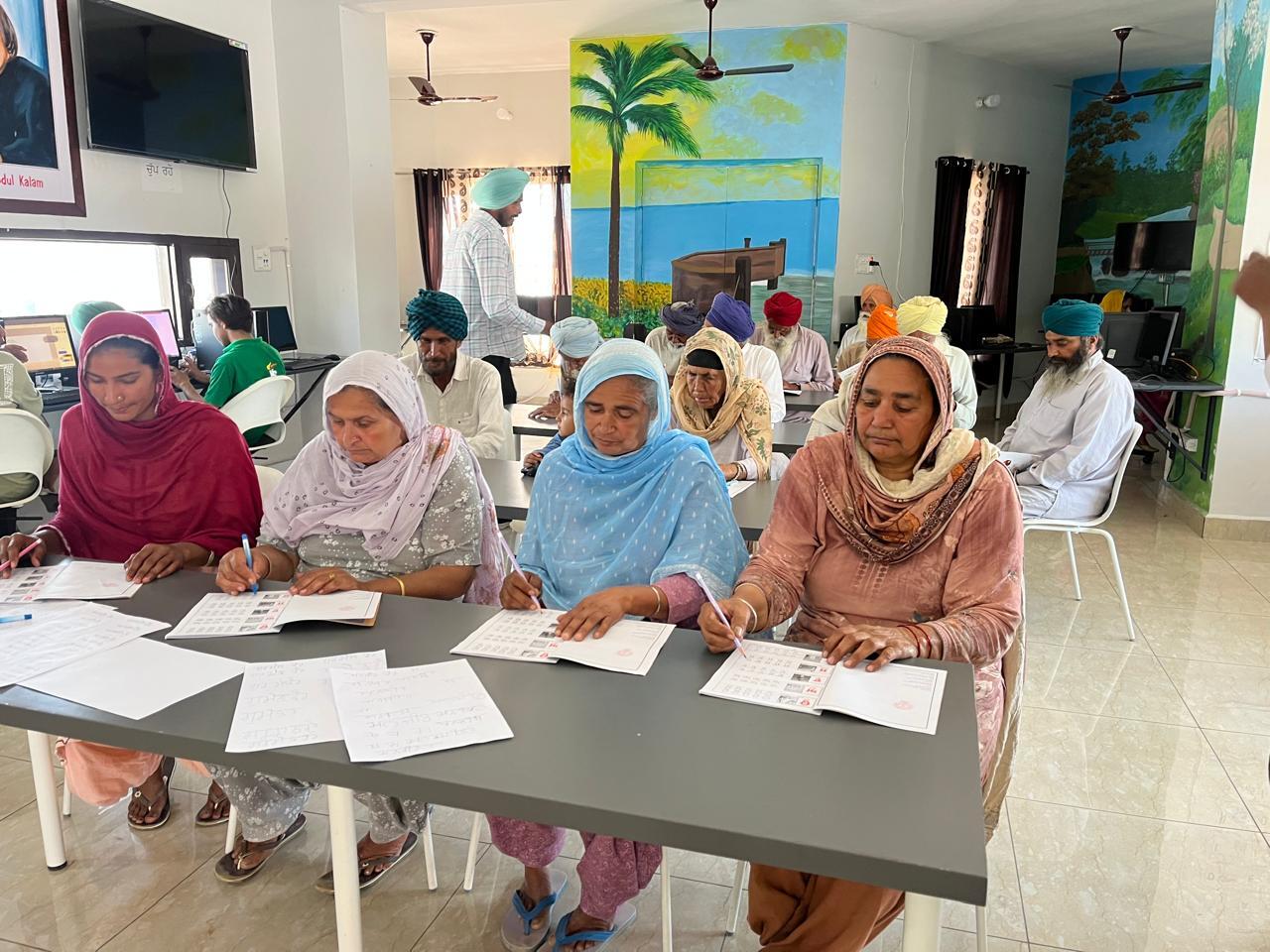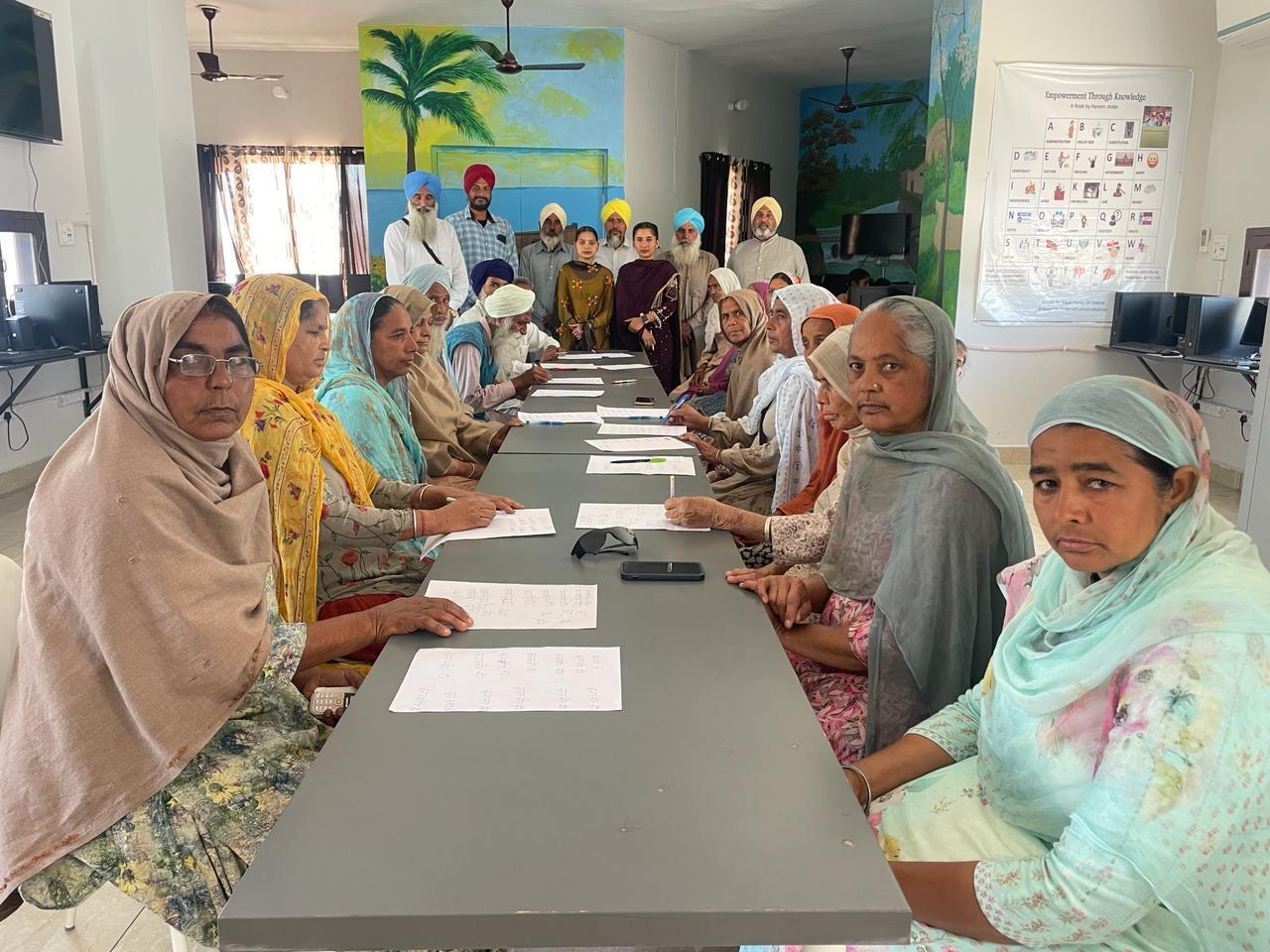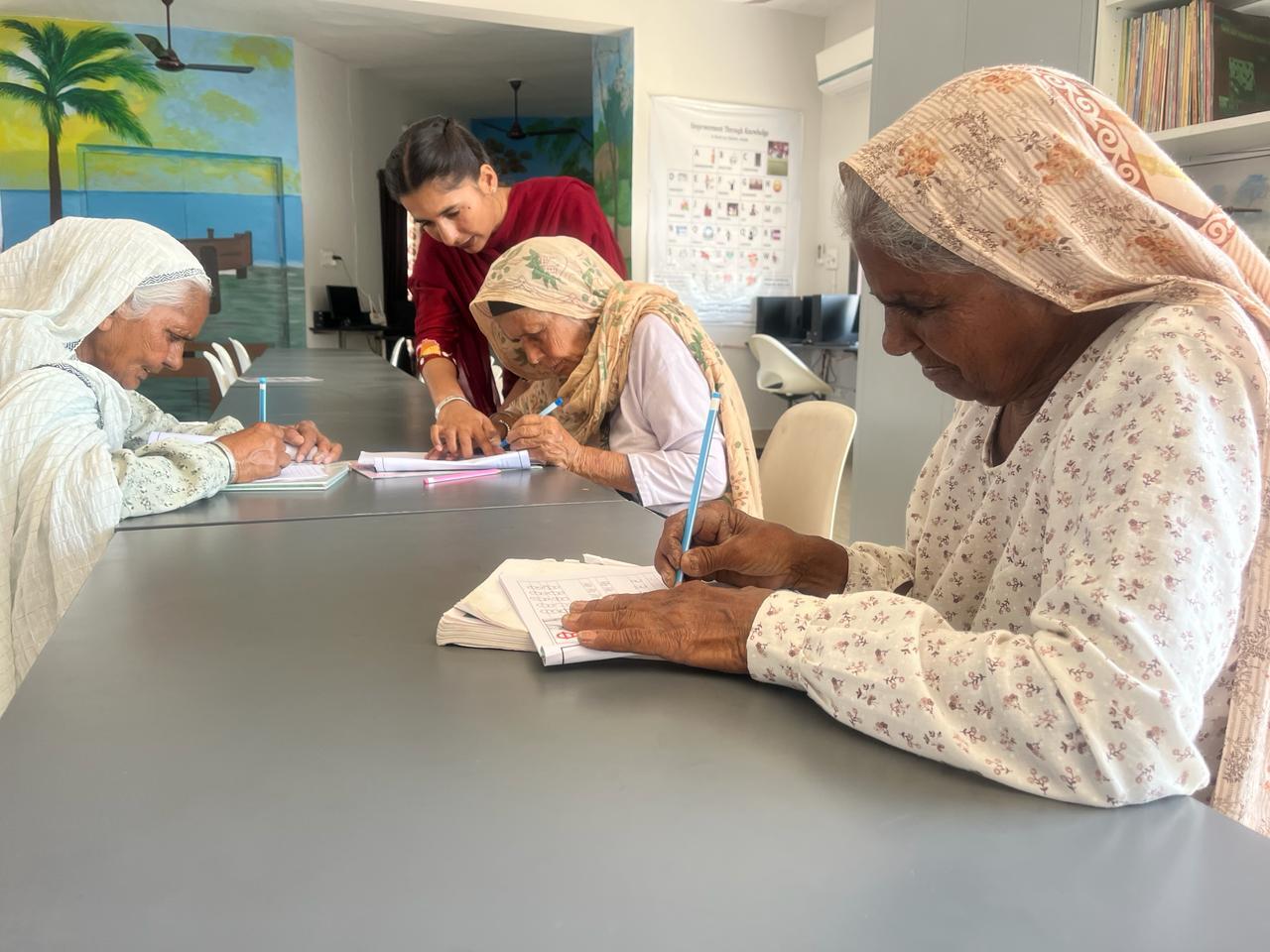In the heart of rural India, nestled in the quaint village of Punjab’s Balloh, a remarkable story unfolds. Here, in a small, unassuming school, a group of elderly individuals are defying age and social norms to pursue their lifelong dream of education. Led by the 28-year-old educator, Rajwinder Kaur, the Bebe Bapu School is a beacon of hope, illuminating the path to knowledge for the village’s senior citizens.
“My lifelong goal is to ensure that nobody stays uneducated in our village,” says Rajwinder. She has made it her mission to ensure that no one in her community is left uneducated. Her commitment is not just about teaching, it’s about improving lives and fostering a culture of learning that transcends generations.
The Bebe Bapu School, established by the Sardar Gurbachan Singh Sewa Samiti Society, has a simple but profound mission: to eradicate illiteracy and empower all elderly residents to read, write, and sign their names.
Rajwinder has been teaching at the school for six months, embracing her role with enthusiasm and a sense of purpose. Each day, she walks into the classroom, ready to make a difference in the lives of her students, who comprise people aged between 50 and above.
In a conversation with The Better India, Rajwinder shares insights into why many elderly residents missed out on education earlier in life. She emphasised how the Bebe Bapu School has been a catalyst for transformation, empowering the elderly with the skills they need to survive. Additionally, she focuses on her future goals, emphasising her vision for continuing to uplift her community through education.
Development of a diverse learning community
Rajwinder sheds light on the factors contributing to the lack of education among the elders. “The primary reason many elders missed out on education in their early years is that educational opportunities were scarce, and there was little societal emphasis on learning. People were often preoccupied with household responsibilities, and as a result, education took a backseat,” she shares. “Many of our parents would say that their own parents didn’t prioritise schooling, which contributed to this cycle of uneducation,” she explains further.
The Bebe Bapu School serves close to 100 students, predominantly those over 50 years old, challenging age norms by welcoming anyone eager to learn. Rajwinder points out a common difficulty faced by her elderly students, “People often struggle with signing documents and use thumbprints. Our goal is to change that.” This fundamental skill is essential, particularly for those who need to address official documents. Rajwinder helps them handle the documents and sign their names instead of relying on thumbprints, as they typically do.

“In addition to signing, we teach our elderly students essential reading and writing skills so they are not left uneducated. Many of them have plans to settle in Canada, so we focus on teaching them to sign in English instead of Punjabi. Some elders can now read books in Punjabi, which is a significant achievement,” she shares.
The atmosphere in Rajwinder’s classroom is warm and helpful, fostering a sense of community and belonging. Understanding that learning can sometimes be daunting, she emphasises the importance of storytelling and light-hearted conversations to keep her students engaged. “We don’t just focus on studies. Sometimes, we tell them stories and chit chat a little to break the monotony of learning,” she asserts, recognising that emotional connections can enhance the learning experience.
The impact of education in the village has been profound. One elderly woman, who once relied solely on her thumbprint to mark her identity, can now sign her name with pride. Rajwinder reflects on this improvement, “It’s a small victory, but it represents so much more. Seeing their progress reminds me that our efforts are worthwhile.” Such milestones are not just personal accomplishments; they signify a broader cultural shift towards valuing education among the older generation.
Intergenerational learning: Promoting growth and collaboration
The Bebe Bapu School operates inside a library, where both children and adults come together to teach and learn from each other. This intergenerational exchange boosts the educational experience, creating a vibrant atmosphere filled with mutual respect and encouragement. Rajwinder encourages young students to assist their elders at home, expanding the reach of their initiative beyond the classroom and into the heart of the community.
Some elders have begun teaching children in their own homes. Rajwinder shares excitedly, “Often, while I’m teaching, I may make mistakes, and the elders aren’t hesitant to correct me. It brings me immense joy when they point out my errors, as it shows they are truly learning.”
A particularly memorable moment came when 27 elders participated in an exam. Rajwinder beamed with pride as she recalled, “When they qualified, it was a celebratory moment. They received certificates, proving they are educated.” The pride that these elders felt in achieving this recognition not only validated their hard work but also inspired others in the village to consider education as an attainable goal.

To further motivate learners, the school has implemented a reward system, any adult who learns to sign their name successfully, receives Rs 100. “This small incentive has a big impact,” Rajwinder notes. When questioned about who is maintaining the school at the moment, she explains that it is primarily supported by the NGO, Sardar Gurbachan Singh Sewa Samiti Society, with little involvement from the government.
Despite initial challenges in managing a classroom of elders, who are often as old as their own parents, Rajwinder discovered that love and respect were key to fostering a positive learning environment. “They have been incredibly cooperative, and their desire to learn has made my job so rewarding,” she shares. This mutual respect has allowed for a collaborative atmosphere where learning is a shared experience, rather than a one-sided endeavour.
Student experiences and accomplishments
“I always wanted to study, but my parents couldn’t afford it with so many siblings to support,” says Karamjit Kaur, a 50-year-old woman who is receiving lessons from Rajwinder Kaur at the Bebe Bapu School. She is breaking barriers by signing all her bank documents instead of relying on a thumbprint. She has also embraced her love for learning by reading books in Punjabi.
“Whatever I learn from Rajwinder, I share with the children at home,” says Karamjit. “They love listening to the stories, and those moments are truly memorable,” she adds. Karamjit Kaur is Rajwinder’s first student to transition from using a thumbprint to signing her name, marking a significant milestone in her journey of education.
Another student, Mahinder Kaur, 65, shares “Since the day Bebe Bapu School began, I’ve had a deep desire to learn. I love studying and have even started identifying the small mistakes Rajwinder makes while teaching. I’ve learned to read books and sign important documents at the bank, and now I also teach children at home. Every day, I strive to grow and share my knowledge.”
Rajwinder takes pride in seeing her students, like Karamjit and Mahinder, achieve milestones they once thought were impossible. Her own sense of fulfilment grows as her elderly students, empowered with knowledge, pass it on to others, creating a ripple effect of education and empowerment in the community.
Commitment to a brighter future
Rajwinder Kaur strives to ensure that everyone in her village has access to education, particularly those who missed the opportunity in their early years. Her dedication and hard work is an inspiration for the younger generation.
As this educational movement continues to grow, it serves as a powerful reminder of the importance of knowledge across all ages. Rajwinder’s journey is not just about teaching, it’s about creating a path of learning and empowerment, one signature at a time. She embodies the spirit of community, demonstrating how education can bridge generational gaps and uplift an entire village.

As more elders join the classes, the impact of this movement is beginning to gain momentum in the village, encouraging families to value education for everyone, not just the younger generation.
Through her tireless efforts, Rajwinder Kaur is not only changing lives but also promoting a culture of learning that celebrates curiosity and growth. Her story is a testament to the transformative power of education and the profound impact one person can have on their community. As she continues her journey, Rajwinder remains a beacon of hope and a champion for the right to learn, ensuring that the flame of knowledge burns brightly in Balloh village in Bathinda for generations to come.
Edited by Arunava Banerjee; All photos courtesy Rajwinder Kaur
No comments:
Post a Comment